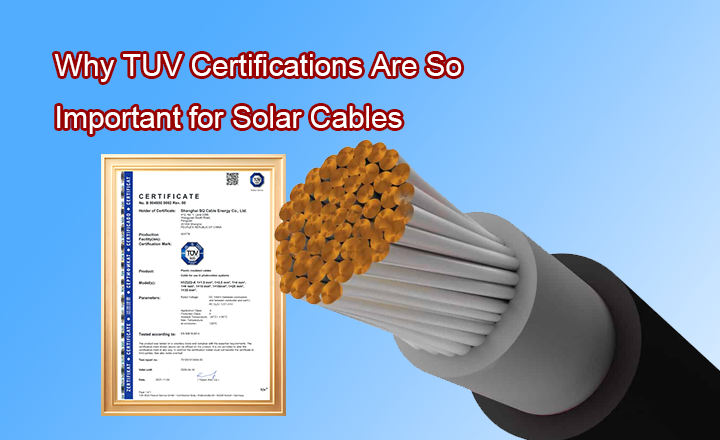News
Why TUV Certifications Are So Important for Solar Cables

The solar energy industry is growing rapidly, and with it comes the need for high-quality, reliable components. Among these, solar cables play a crucial role in ensuring efficient power transmission from photovoltaic (PV) panels to inverters and the grid. However, not all solar cables are created equal. TUV solar cable is one of the most respected and recognized standards in the industry, ensuring that solar cables meet stringent safety, performance, and durability requirements.
In this comprehensive guide, we will explore:
- What TUV certification means
- Why TUV certification is essential for solar cables
- Standards for TUV solar cables
- Benefits of using TUV solar cables
- How to identify genuine TUV solar cables
By the end of this article, you’ll understand why TUV certification is non-negotiable for solar installations.
What Is TUV Certification?
TUV (Technischer Überwachungsverein, meaning “Technical Inspection Association”) is a globally recognized certification body that tests and certifies products for safety, quality, and performance. TUV Rheinland and TUV SUD are among the most prominent TUV organizations providing certifications for solar components.
TUV Standards for Solar Cables
Solar cables must comply with specific TUV standards to ensure they can withstand harsh environmental conditions, UV exposure, and high temperatures. The most important standards include:
- TUV 2 PfG 1169 / EN 50618 – Specifies requirements for PV cables, including:
- UV resistance
- Flame retardancy
- Weather resistance
- Long-term durability
- IEC 62930 – International standard for PV cables, closely aligned with TUV 2 PfG 1169.
- TUV Rheinland’s PV Cable Certification – Ensures cables meet high safety and performance benchmarks.
Why Are TUV Certifications Critical for Solar Cables?
1. Ensures Safety & Prevents Fire Hazards
Solar cables operate in extreme conditions—high temperatures, UV exposure, and potential mechanical stress. Non-certified cables may degrade, leading to short circuits, fires, or system failures. TUV-certified cables are tested for:
- Flame resistance (self-extinguishing properties)
- Thermal stability (withstanding temperatures from -40°C to 120°C)
- Chemical and oil resistance
2. Guarantees Long-Term Durability
Solar installations are long-term investments (25+ years). Low-quality cables can crack, become brittle, or fail prematurely, leading to costly repairs. TUV-certified cables undergo accelerated aging tests to ensure they last decades under real-world conditions.
3. Compliance with International Regulations
Many countries and solar project financiers require TUV certification for insurance and warranty purposes. Using uncertified cables may void warranties or lead to legal non-compliance.
4. Improves System Efficiency & Performance
High-quality TUV solar cables have:
- Low electrical resistance (minimizing power loss)
- Optimal insulation thickness (preventing leakage currents)
- Superior conductivity (maximizing energy yield)
5. Reduces Maintenance & Replacement Costs
Investing in TUV solar cables means:
- Fewer failures
- Lower risk of system downtime
- Reduced long-term maintenance costs
How to Identify Genuine TUV-Certified Solar Cables
With counterfeit products in the market, it’s crucial to verify TUV certification. Here’s how:
- Check for the TUV Mark – Look for the official TUV Rheinland or TUV SUD logo on the cable jacket.
- Verify Certification Online – Use TUV’s certification database to confirm authenticity.
- Review Manufacturer Documentation – Reputable suppliers provide test reports and certification copies.
- Beware of Cheap Imitations – If the price seems too good to be true, it probably is.
TUV certification is not just a label—it’s a guarantee of safety, reliability, and compliance for your solar power system. Whether you’re an installer, EPC contractor, or solar farm developer, using TUV-certified cables ensures:
- Long-term system reliability
- Reduced fire risks
- Higher energy efficiency
- Compliance with global standards
Frequently Asked Questions (FAQs)
Q1: Can I use regular cables instead of TUV solar cables?
No. Regular cables lack UV resistance, flame retardancy, and durability needed for solar applications.
Q2: How long do TUV solar cables last?
Properly installed TUV-certified cables can last 25-30 years, matching PV panel lifespans.
Q3: Are all TUV certifications the same?
No. Ensure the cable meets TUV 2 PfG 1169 / EN 50618 for PV applications.
Q4: Where can I buy TUV solar cables?
Purchase from authorized distributors or directly from reputable manufacturers.